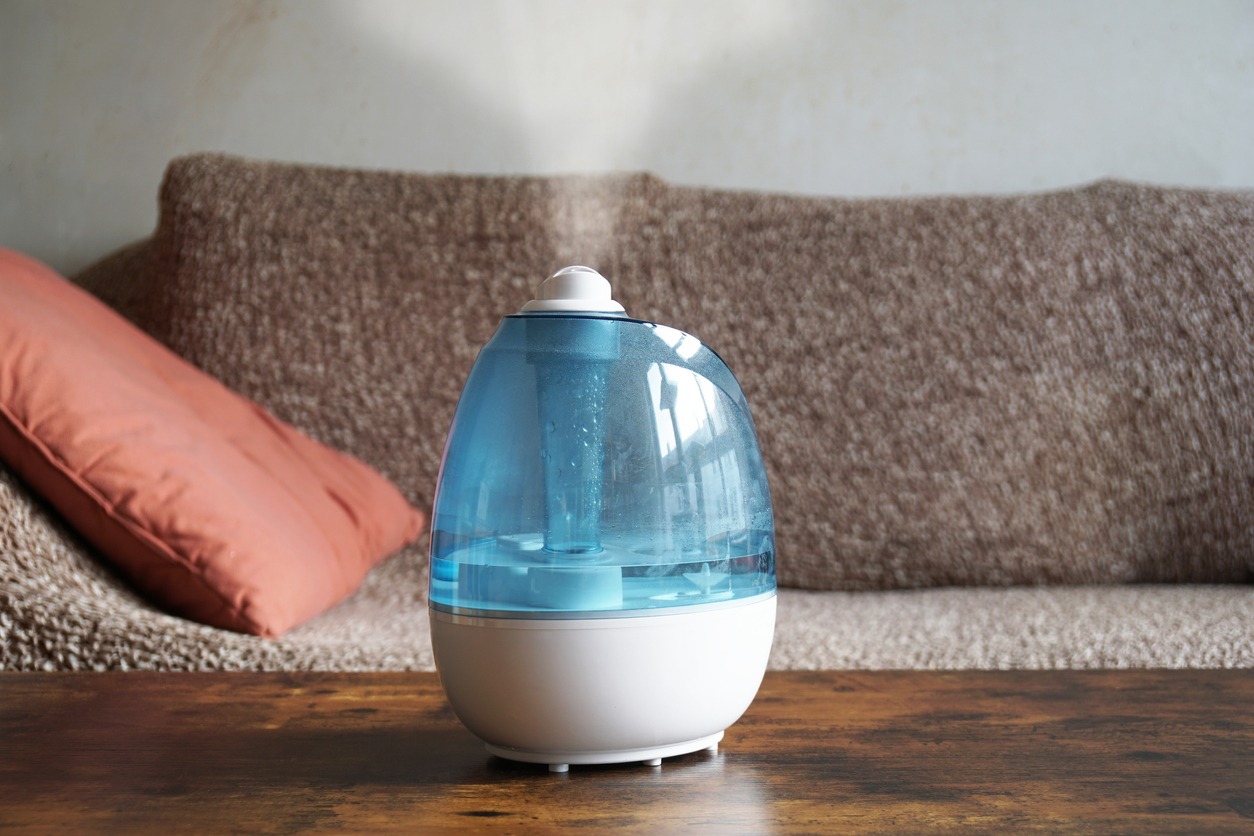When you think of humidity, you probably think about memories of stuffy, sticky summer evenings or cold, dry winter mornings. To most, humidity is rarely in the conversation when it comes to home comfort. However, it’s a real concern that affects nearly every aspect of your home, from family health to living room furniture.
Humidity is the measure of water vapor in the air. It is expressed as a percentage and is determined by the temperature and moisture content of the air. Warm air can hold more water vapor than cold air, so humidity levels are higher in the summer. Humidity also affects how we feel. When the humidity is high, we feel hotter and more uncomfortable. While every home is different, it is recommended that your home stay between 30 and 40 percent humidity to maintain comfort year-round. Keep reading to learn about using a humidifier vs dehumidifier in your home.
What is a humidifier?
A humidifier is a device that increases the humidity of a room by releasing water vapor into the air. This can be helpful in winter months when the air is dry, as it can help to prevent respiratory problems and skin irritation. There are several types of humidifiers, including evaporative, ultrasonic, and impeller.
Evaporative humidifiers work by drawing in moist air from outside and then cooling it before releasing it back into the room. Ultrasonic humidifiers create a fine mist by vibrating water at a high frequency. Impeller humidifiers use spinning disks to disperse water droplets into the air.
Dehumidifiers remove moisture from the air, which can be helpful in areas where there is excessive humidity or in homes with allergies or asthma. They work by drawing moist air across an evaporator coil, where the moisture is removed and collected in a reservoir.
What is a dehumidifier?
A dehumidifier is a household appliance that reduces the amount of humidity in the air. Dehumidifiers work by drawing in moist air, cooling it, and then removing the water vapor. This process can be accomplished in a number of ways, including using a heating element to boil the water out of the air, using a refrigerant to condense the water vapor, or using a desiccant to absorb the water.
Refrigerant dehumidifiers use a compressor and a refrigerant to remove humidity from the air. These dehumidifiers are the most common type and are available in both compact and full-size models. Desiccant dehumidifiers use a desiccant material, such as silica gel to absorb moisture from the air. These dehumidifiers are typically small and portable and are used to dehumidify small spaces. Thermal dehumidifiers use a heating element to remove humidity from the air. These dehumidifiers are typically large and heavy and are used in areas where high humidity is a problem.
When should you use a humidifier or a dehumidifier?
The main difference between humidifiers and dehumidifiers is that humidifiers add moisture to the air, while dehumidifiers remove moisture from the air. Humidifiers are helpful in the winter months when the air is dry and in areas with low levels of relative humidity. Dehumidifiers are helpful during the summer months when excess humidity can cause numerous problems.
There are several ways to tell if the indoor air in your home is too dry. Excessively dry air can produce some pretty noticeable effects on your body as well as your home. These symptoms can range from mild annoyances to illness. If you notice things such as increased static electricity, random nosebleeds, unusually dry skin, chapped lips, and dry throat, you could have overly dry air in your home. If this is the case, you might consider adding a humidifier to your home to improve the air quality.
Just as overly dry air can cause numerous issues, a high level of humidity in your home can also create some problems. There are a couple of telltale signs of high humidity levels like clammy skin, foggy windows, and a heavy yet warm atmosphere. Additionally, you might also smell or visibly notice the presence of mildew or musty odors when your home is too humid. Excessive moisture buildup can create a perfect breeding ground for the dangerous growth of mold spores. If you notice any of these conditions, you should consider utilizing a dehumidifier to remove excess moisture from the air.
Overall, humidifiers and dehumidifiers are both important in maintaining a healthy home environment. Humidifiers increase the moisture in the air, which can help with dry skin, allergies, and asthma. Dehumidifiers decrease the moisture in the air, which can help with preventing mold and mildew growth, and uncomfortable conditions.

